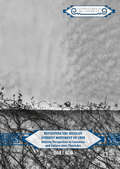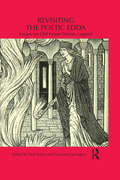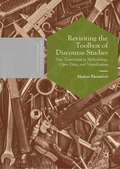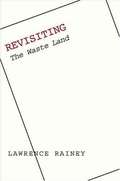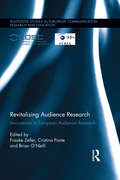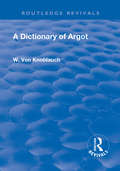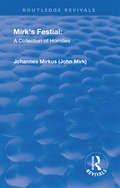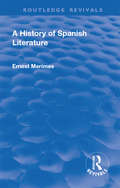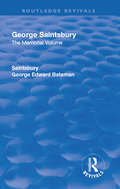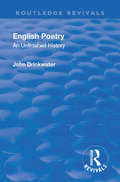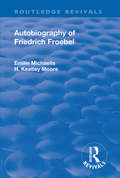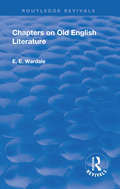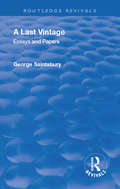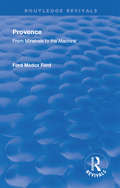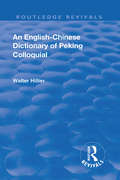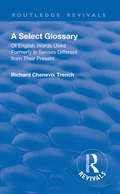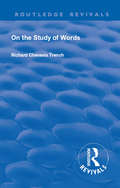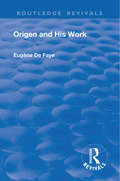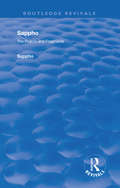- Table View
- List View
Revisiting the Elegy in the Black Lives Matter Era (Routledge Research in American Literature and Culture)
by Tiffany Austin; Sequoia Maner; Emily Ruth Rutter; darlene anita scottRevisiting the Elegy in the Black Lives Matter Era is an edited collection of critical essays and poetry that investigates contemporary elegy within the black diaspora. Scores of contemporary writers have turned to elegiac poetry and prose in order to militate against the white supremacist logic that has led to recent deaths of unarmed black men, women, and children. This volume combines scholarly and creative understandings of the elegy in order to discern how mourning feeds our political awareness in this dystopian time as writers attempt to see, hear, and say something in relation to the bodies of the dead as well as to living readers. Moreover, this book provides a model for how to productively interweave theoretical and deeply personal accounts to encourage discussions about art and activism that transgress disciplinary boundaries, as well as lines of race, gender, class, and nation.
Revisiting the Mexican Student Movement of 1968
by Juan J. RojoTracing the evolution of Mexican literary and cultural production following the Tlatelolco massacre, this book shows its progression from a homogeneous construct set on establishing the "true" history of Tlatelolco against the version of the State, to a more nuanced and complex series of historical narratives. The initial representations of the events of 1968 were essentially limited to that of the State and that of the Consejo Nacional de Huelga (National Strike Council) and only later incorporated novels and films. Juan J. Rojo examines the manner in which films, posters, testimonios, and the Memorial del 68 expanded the boundaries of those initial articulations to a more democratic representation of key participants in the student movement of 1968.
Revisiting the Poetic Edda: Essays on Old Norse Heroic Legend (Routledge Medieval Casebooks)
by Carolyne Larrington Paul AckerBringing alive the dramatic poems of Old Norse heroic legend, this new collection offers accessible, ground-breaking and inspiring essays which introduce and analyse the exciting legends of the two doomed Helgis and their valkyrie lovers; the dragon-slayer Sigurðr; Brynhildr the implacable shield-maiden; tragic Guðrún and her children; Attila the Hun (from a Norse perspective!); and greedy King Fróði, whose name lives on in Tolkien’s Frodo. The book provides a comprehensive introduction to the poems for students, taking a number of fresh, theoretically-sophisticated and productive approaches to the poetry and its characters. Contributors bring to bear insights generated by comparative study, speech act and feminist theory, queer theory and psychoanalytic theory (among others) to raise new, probing questions about the heroic poetry and its reception. Each essay is accompanied by up-to-date lists of further reading and a contextualisation of the poems or texts discussed in critical history. Drawing on the latest international studies of the poems in their manuscript context, and written by experts in their individual fields, engaging with the texts in their original language and context, but presented with full translations, this companion volume to The Poetic Edda: Essays on Old Norse Mythology (Routledge, 2002) is accessible to students and illuminating for experts. Essays also examine the afterlife of the heroic poems in Norse legendary saga, late medieval Icelandic poetry, the nineteenth-century operas of Richard Wagner’s Der Ring des Nibelungen, and the recently published (posthumous) poem by Tolkien, The Legend of Sigurd and Gudrún.
Revisiting the Toolbox of Discourse Studies: New Trajectories in Methodology, Open Data, and Visualization (Postdisciplinary Studies in Discourse)
by Markus RheindorfThis book revisits discourse analytic practice, analyzing the idea that the field has access to, provides, or even constitutes a ‘toolbox’ of methods. The precise characteristics of this toolbox have remained largely un-theorized, and the author discusses the different sets of tools and their combinations, particularly those that cut across traditional divides, such as those between disciplines or between quantitative and qualitative methods. The author emphasizes the potential value of integrating methods in terms of triangulation and its specific benefits, arguing that current trends in Open Science require Discourse Studies to re-examine its methodological scope and choices, and move beyond token acknowledgements of ‘eclecticism’. In-depth case studies supplement the methodological discussion and demonstrate the challenges and benefits of triangulation. This book will be a valuable resource for students and scholars in Discourse Studies, particularly those with an interest in combining methods and working across disciplines.
Revisiting the Waste Land
by Lawrence S. RaineyThis groundbreaking book of literary detective work alters our understanding of T. S. Eliot's poetic masterpiece, The Waste Land. Lawrence Rainey not only resolves longstanding mysteries surrounding the composition of the poem but also overturns traditional interpretations of the poem that have prevailed for more than eighty years. He shines new light on Eliot's greatest achievement and on the poem's place in the modern canon. Far from the austere and sober monument to neoclassicism that admirers have praised,The Waste Land turns out to be something quite different: something grim and wild, unruly and intractable, violent and shocking and radically indeterminate, yet also deeply compassionate. Rainey looks at how Eliot went about writing the poem and at the sequence in which he composed the parts. Arriving at new insights into the poet's intentions, Rainey unsettles tradition-bound views of the poem and shows us that The Waste Land is even stranger and more startling than we knew.
Revista Aventuras: Aventuras Student Magazine Grade 4 (¡Arriba la Lectura!)
by Gisela O'BrienNIMAC-sourced textbook
Revista Aventuras: ¡Echa un vistazo! [Grade 1] (¡Arriba la Lectura!)
by Gisela O'BrienNIMAC-sourced textbook
Revitalising Audience Research: Innovations in European Audience Research (Routledge Studies in European Communication Research and Education)
by Brian O'Neill Frauke Zeller Cristina PonteThe revitalisation of audience studies is not only about new approaches and methods; it entails a crossing of disciplines and a bridging of long-established boundaries in the field. The aim of this volume is to capture the boundary-crossing processes that have begun to emerge across the discipline in the form of innovative, interdisciplinary interventions in the audience research agenda. Contributions to this volume seek to further this process though innovative, audience-oriented perspectives that firmly anchor media engagement within the diversity of contexts and purposes to which people incorporate media in their daily lives, in ways often unanticipated by industries and professionals.
Revitalizing Minority Languages: New Speakers of Breton, Yiddish and Lemko (Palgrave Studies in Minority Languages and Communities)
by Michael HornsbyNew speakers are an increasingly important aspect of the revitalization of minority languages since, in some cases, they can make up the majority of the language community in question. This volume examines this phenomenon from the viewpoint of three minority languages: Breton, Yiddish and Lemko.
Revival: (French-English) (Routledge Revivals)
by W Knoblauch vonStudents and Readers of French Literature, who require a more complete dictionary of Argot than the present volume, should consult these learned and excellent works.
Revival: A Collection Of Homilies (classic Reprint) (Routledge Revivals)
by John MirkThis first part contains only the text and a glossary. In the second part, with Introduction concerning the MSS. and the arrangement of the texts, &c. I may therefore, here confine myself to a very few remarks. In addition to the ordinary contraction signs the scribe of the Gough MS. frequently make a stroke over or otherwise adds a a stroke to the last letter of the words.
Revival: A History Of Spanish Literature (1930) (Routledge Revivals)
by Ernest MerimeeThe present English version, authorized by the publishers and heirs of M. Merimee, is based on the third French Edition. New material of two sorts has been added, however. First, the translator has been allowed to utlize an annotated, interleaved copy of the Precis, 1922, in which the author, and after his death his son Henri, himself a distinguished Hispanist, had set down material for the next revision. This accounts for many inserted names and phrases, and some paragraphs. Second, the translator has rewritten and added with some freedom.
Revival: A New Collection of His Essays and Papers (Routledge Revivals)
by George Edward SaintsburyThis Memorial Volume is being published to mark the centenary year of George Saintbury's birth. It contains essays, hitherto uncollected in book form, on authors such as Dryden, Herrick, Ben Jonson, Browning, Coleridge; studies of Carlyle, Jane Welsh Carlyle, Shelley, Disraeli; and papers on subjects that range from "The Qualities of Wine" to "Eighteenth Century Poetry". There is a biographical memoir of Saintsbury by Professor A. Blyth Webster and personal portraits by Professor Oliver Elton, Sir Herbert Grierson, and others. Compiled under the co-editorship of Dr John W. Oliver and Mr Augustus Muir (who were students of Saintsbury's at the University of Edinburgh) and of Dr A. M. Clark, lecturer in the English Department at that University, this volume will be welcomed by the steadily increasing number of those who appreciate the richness of Saintsbury's personality and the value of his work as a critic and literary historian.
Revival: An elementary handbook (Routledge Revivals)
by Henry Butler ClarkeDuring the time that I have held the Taylorian Teachership of Spanish at Oxford, I have frequently received letters asking what there is to read in Spanish besides Cervantes and Calderon and what editions should be used. The present volume is intended to answer these questions, and to show the position occupied by the great writers in the general scheme of the literature of their country. The various divisions of the great subject have been exhaustively treated up to their several dates by Nicolas Antonio, Ticknor, Amador de los Rios, Schack and Wolf, to whose books I beg to acknowledge my many obligations, hoping at the same time that the present general sketch may be useful to the general reader, and to the beginner, and may serve as an introduction to more extensive works.I am aware that a few short extracts, however well chosen can give no adequate idea of the manner of a great writer or of the merits of a great book, and that translations, even by the most skilful hands, are wont to reproduce the defects rather than the beauties of their original. The extracts here printed are intended to relieve the monotony of a long list of short notices of authors, and to illustrate the development of the language and progress of literary method; they are, as far as possible, characteristically Spanish in subject and, it is hoped, of sufficient interest to induce readers to refer to the books from which they are taken
Revival: An unfinished history (Routledge Revivals)
by John DrinkwaterWhen a Poet writes poetry he can scarcely fail to interest. And the author of this posthumous volume was not only a poet but no mean critic too. As a result, his approach to English Poetry is not a work of merely casual interest: it is illuminating. No one could fail to be enriched and delighted by its discriminating enthusiasms, its happy quotations, and the no less happy judgements, discoveries, definitions and phrases which it gives us. The historical portion is contained in the latter half, which deals with its subject in a discursive way from the beginnings to Elizabethan times - where the author stopped in the middle of a sentence. This premature ending is deepy regretted. But, fortunately for us, the first five chapters are devoted to general and personal observations, and are so full of references to the intervening and modern periods that we can genuinely claim to have here a fair impression of Drinkwater's view of the whole panorama of English Poetry.
Revival: Autobiography of Friedrich Froebel (Routledge Revivals)
by Friedrich FroebelOriginally published in 1915, the Autobiography of Fredrich Froebel provides a detailed overview of the life of the eminent German educator Fredrich Froebel, it charts his life and looks at his significant contribution to the field of education, including his Idealist philosophy of early childhood education, and his establishment of the kindergarten, a school for four-and five-year-old children that is found worldwide. The book also looks at the community surrounding Froebel and includes a chapter by Madame Louise Froebel’s providing a reminiscence of her husband’s life.
Revival: Chapters on Old English Literature (Routledge Revivals)
by Edith Elizabeth WardaleThese chapters on Old English Literature are intended to fill the gap between Professor Thomas’s valuable, but all too brief account in his English Literature before Chaucer, and longer works, such as those of Stopford Brooke and the Chapters in the first volume of the Cambridge History of English Literature. My primary object has, of course, been to make the works themselves known to my readers, but I have also tried to trace the development of prose and poetry during the period, showing in the poetry the modifications of the original Germanic character brought about by later influences of all kinds, and noting those forms or features which lead on to Middle English. In dealing with the many unsettled questions, I have given only the views which seem to me most important. Had I wished to do more, it would obviously have been impossible in the space which I have allowed myself; but references to other works are added for a student who may wish to make a more thorough investigation of such points for himself.
Revival: Essays and Papers by George Saintsbury (Routledge Revivals)
by George Edward SaintsburyThe Editors of the Saintsbury Memorial Volume have been encouraged by the welcome which that book received to make a final gathering of George Saintbury's writings. From a score of different sources they have chosen essays and papers that have lain uncollected, with their themes ranging from Captain Marryat to Erasmus, from Rosetti to Xenephon, from Swinburne to Balzac's early pot boilers. Included is an entrancing study of the literary associations of the city of Bath; and the editors have followed Saintbury's own example by collecting a Scrap Book more than thirty shorter notes and jeux d'esprit on all kinds of subjects: wigs, sensation novelists, Drummond and Ben Jonson, George Sand, compulsory Greek at Oxford, Shakespeare and Welsh, Laurence Sterne tittle-tattle, Marcel Proust, and much else in true Saintsburian vein.
Revival: From Minstrels To The Machine (Routledge Revivals)
by Ford Madox Ford"Provence" may perhaps be described as the crystallisation of the main idea running through the Great Trade Route, which we published a year ago. Of that book Mr A.G. McDonnell wrote in the Observer: "It is an Indictment, a Philipic....I know of no books to compare with this since Winwood Reade's Martyrdom of Man" But if "The Great Trade Route" was the destructive onslaught on dubious aspects of contemporary civilisation, "Provence" is the celebration of what might have been and what, according to Mr. Ford, may still yet be - contrasted with what is. For in that triangle of sun-baked , wind-swept, austere yet generous land, bounded as to its base by the Mediterranean and as to its sides, by the Rhone and the Alps, Mr Ford sees all the pride of past European splendour, the small healthy core of Europe's ailing present, the only promise for her future. How and why he sees all this his book alone can reveal, with its history, its moralisings, its descriptions vitalised and clarified by art.
Revival: New Edition Enlarged by Sir Trelawny Backhouse and Sidney Barton (Routledge Revivals)
by Walter Caine HillierMany of the marks attached to the phonetic rendering of the Chinese words in this volume differ from those assigned to them in the dictionaries. These apparent discrepencies are intentional, the tones being given as they are applied, or appear to the ear of the compiler to be applied, by the natives of Peking.
Revival: Of English Words Used Formerly in Senses Different from their Present (Routledge Revivals)
by Richard Chenevix TrenchThis volume is intended to be a contribution to a special branch of the study of our own language. It proposes to trace in a popular manner and for general readers the changes of meaning which so many of its words have undergone; words which, as current with us as they were with out forefathers, yet meant something different on their lips from what they mean on ours.
Revival: On the Study of Words (Routledge Revivals)
by Richard Chenevix TrenchFirst published in 1904, this book contains the conclusions of a series of lectures exploring the moral and historical value of single words. The author argues that, just as wisdom and knowledge are discoverable in books, so too are these treasures to be found in individual words themselves.
Revival: Origen and his Work (Routledge Revivals)
by Eugene de FayeLast year (1925) the Olaus Petri Endowment greatly honoured the author by inviting him to deliver a few lectures on Origen at the University of Upsala. It was agreed that they should be published and we now offer them to the public exactly as they were delievered. There could be no question of expounding the entire thought of Origen in eight conferences. We have been compelled to pass over more than one important doctrine - for instance, his ideas on the Gnosis. Still less was it possible to set forth in these lectures the enormous mass of documents upon which our exposition of the theology of Origen is based.
Revival: Sappho - Poems and Fragments (Routledge Revivals)
by SapphoThe object of this book is to provide with a popular and a comprehensive edition of Sappho, containing all that is so far known of her unique personality and her incompatible poemsLittle remains today of the writings of the archaic Greek poet Sappho (fl. late 7th and early 6th centuries B.C.E.), whose work is said to have filled nine papyrus rolls in the great library at Alexandria some 500 years after her death. The surviving texts consist of a lamentably small and fragmented body of lyric poetry--among them, poems of invocation, desire, spite, celebration, resignation, and remembrance--that nevertheless enables us to hear the living voice of the poet Plato called the tenth Muse. Sappho is rated as the supreme poetess and is regarded in the same vein as Shakespeare and Homer the supreme poets.

